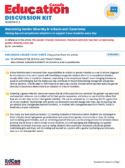Welcoming Gender Diversity in Schools and Classrooms
Moving beyond exceptional situations to support trans students every day
Download the session. (142.40 kB / pdf)
DownloadIn reference to the article The Gender-Friendly Classroom: Practical advice for teachers on welcoming gender diversity every day
Key Definitions from the Ontario Human Rights Commission
Gender identity: each person’s internal and individual experience of gender. It is a person’s sense of being a woman, a man, both, neither, or anywhere along the gender spectrum. A person’s gender identity may be the same as or different from their birth-assigned sex.
For most people, their sex and gender identity align. For some, it does not. A person may be born male but identify as a woman, or born female but identify as a man. Other people may identify outside the categories of woman/man, or may see their gender identity as fluid and moving between different genders at different times in their life.
Gender expression: how a person publicly presents or expresses their gender. This can include behaviour and outward appearance such as dress, hair, make-up, body language and voice. A person’s chosen name and pronoun are also common ways people express their gender. Others perceive a person’s gender through these attributes.
All people, regardless of their gender identity, have a gender expression and they may express it in any number of ways. For trans people, their chosen name, preferred pronoun and apparel are common ways they express their gender. People who are trans may also take medically supportive steps to align their body with their gender identity.
Trans or transgender: an umbrella term that describes people with diverse gender identities and gender expressions that do not conform to stereotypical ideas about what it means to be a girl/woman or boy/man in society. “Trans” can mean transcending beyond, existing between, or crossing over the gender spectrum. It includes but is not limited to people who identify as transgender, transsexual, cross dressers or gender non-conforming (gender variant or gender queer).
“Trans” includes people whose gender identity is different from the gender associated with their birth-assigned sex. Trans people may or may not undergo medically supportive treatments, such as hormone therapy and a range of surgical procedures, to align their bodies with their internally felt gender identity.
People who have transitioned from one gender to another may simply identify as female or male. Others may also identify as trans, as a trans woman or a trans man. Some people may identify as trans and not use the labels “female” or “male.” Others may identify as existing between male and female or in different ways beyond the binary of male/female.
Trans people may identify their gender in many ways. There is no single or universal experience of what it means to be trans. As a result, different trans people face distinct forms of discrimination in society, and this may relate to whether they identify as male, female, a person with a trans history, a person in the process of transitioning, a trans man, trans woman, transsexual, or gender non-conforming.
Source: Ontario Human Rights Commission. “Appendix B: Glossary for understanding gender identity and expression.” Accessible from http://www.ohrc.on.ca/en/
ASK OUR EXPERTS
AIM: TO ENCOURAGE INTERACTION WITH RESEARCHERS
Does your group still have burning questions or comments? Encourage them to connect with Dr. Lee Airton, lead author for the article on which this discussion guide is based: www.genderyourguide.com
Email: lee.airton@queensu.ca

